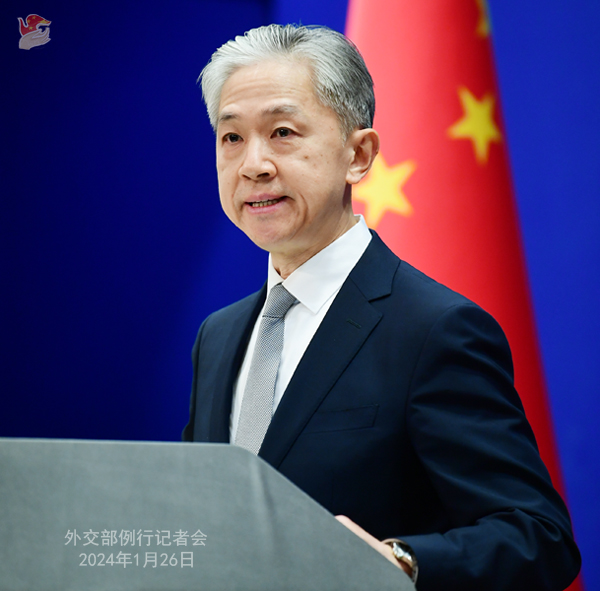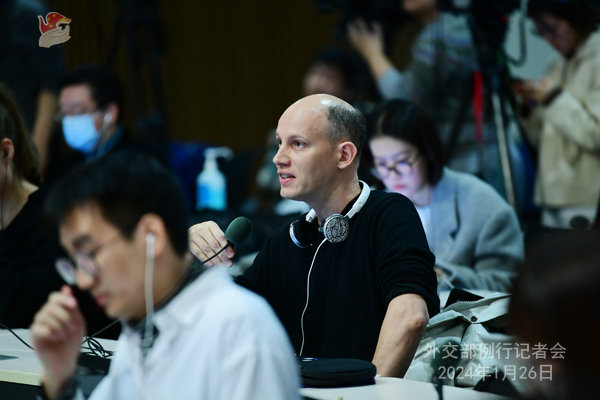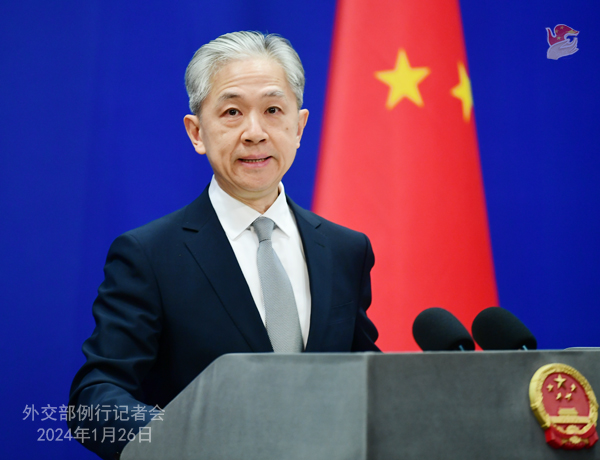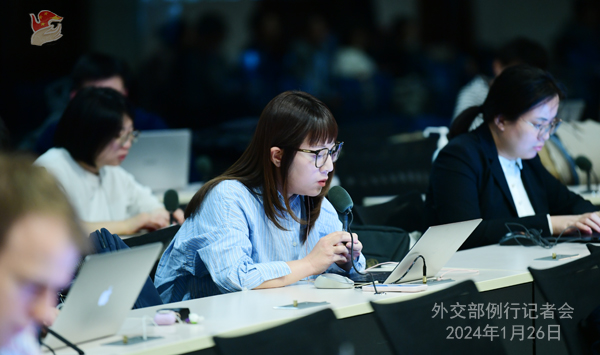
People’s Republic of China


At the invitation of Member of the Political Bureau of the CPC Central Committee and Minister of Foreign Affairs Wang Yi, President of the 78th Session of the UN General Assembly Dennis Francis will visit China from January 27 to 31.
China Daily: As we celebrate the first International Day of Clean Energy today, we noted that the International Energy Agency (IEA) recently published a report saying that China is on track to meet the 2030 wind and solar target this year, six years ahead of schedule. By 2028, nearly 60 percent of the world’s electricity from renewable energy will be generated in China. What’s your comment?
Wang Wenbin: Energy transition is an intrinsic path toward realizing the Paris Agreement targets and achieving a green and sustainable future. China is a doer in global clean energy transition. China has turned from a “follower” to a “forerunner” and to a “pacesetter” in a short time span, making a positive contribution to the global transition to clean energy and low-carbon economic growth.
In recent years, China has made notable progress in developing clean energy, including solar power, wind power, NEVs and nuclear energy. By the end of 2023, China’s installed capacity of renewable energy accounted for over half of the total installed power capacity. In 2023, NEV production and sales in China reached 9.587 million and 9.495 million respectively, up by 35.8 percent and 37.9 percent year on year respectively. China’s NEV production and sales account for over 60 percent of the global total, ranking first in the world for nine consecutive years. The IEA’s report Renewables 2023 pointed out that China’s installed solar PV capacity last year is equal to the global total of 2022 and China’s installed wind power capacity soared by 66 percent year on year, registering a remarkable growth rate. That said, to achieve global goals, global joint efforts are required. In particular, favorable conditions need to be created for extensive international cooperation, and protectionism, unilateralism and politicization must be abandoned.
While pursuing its own clean and low-carbon development, China has made an active contribution to the global energy transition and response to climate change. A large number of clean energy projects, including the Al Dhafra PV2 Solar Power Plant in the UAE, the Noor III solar-thermal power plant in Morocco, the De Aar Wind Power Project in South Africa, and the Karot Hydropower Project in Pakistan, are typical examples of China’s extensive cooperation with other countries on clean and renewable energy. During COP28 to the UNFCCC concluded last month, parties attending the conference spoke highly of China’s vision of transition to low-carbon energy and achievements in the development of clean energy. They noted that China’s solutions have pointed to the direction of the global energy transition, as they are important, practical and feasible solutions for countries, especially developing ones, to advance energy transition, accelerate economic growth and improve the ecological environment. This is of great significance to global energy transition and climate governance.
Green is a defining feature of Chinese modernization. China will continue to uphold the vision of seeking harmony between humanity and nature, take solid steps to advance the energy transition, and make a greater contribution to the global response to climate change.
Reuters: Taiwanese officials have said that the Chinese mainland seeks to seize Taiwan’s “diplomatic relations.” In fact, it does not rule out the possibility that the Chinese mainland will use the Tuvalu elections to maliciously manipulate issues and influence specific candidates. What does the Ministry of Foreign Affairs have to say about this?
Wang Wenbin: The resumption of China-Nauru diplomatic ties shows to the world again that the one-China principle is where global opinion trends and the arc of history bends. The big family of nations committed to the one-China principle will continue to expand, which is a fact that will not change no matter how “Taiwan independence” and their supporters think otherwise or what the DPP authorities say. We urge a handful of countries who still keep so-called “diplomatic ties” with Taiwan to keep up with the trend of the times and join the family of nations that endorse the one-China principle as soon as possible.
TASS: I have two questions. First, on January 24, Ukrainian air defenses shot down a Russian Il-76 transport aircraft at the Russia-Ukraine border, which crashed in Russia’s Belgorod region after being hit by several missiles. The aircraft was carrying 65 Ukrainian prisoners of war. What is the comment of the Foreign Ministry? The other question is, the UK-based Financial Times reported that the US has asked China to urge Tehran to exert influence on the Houthi forces attacking commercial ships in the Red Sea, but has seen no sign of help from the Chinese government. What is the Foreign Ministry’s comment on this?
Wang Wenbin: On your first question, we noted the reports. On the Ukraine crisis, China’s position is consistent and clear. We always believe that dialogue and negotiations are the only viable way out of the Ukraine crisis. We hope all parties will be committed to a political settlement of the crisis, stop the fighting as soon as possible and work together to alleviate the situation.
We answered your second question the day before yesterday, which you may refer to.

Global Times: It’s reported that the US Space Force in its assessment report “Competing in Space” said that China and Russia are testing and developing anti-satellite weapons to deny, disrupt or destroy satellites and space services. The two countries often mask or conceal these activities to avoid international condemnation. To counter these threats, the US Space Force launched new early warning satellites to track Chinese or Russian spacecraft. What’s China’s comment?
Wang Wenbin: The US has long been repeatedly hyping up China as a “threat in outer space” to smear and attack China, which is only an excuse for the US to expand its forces in outer space and maintain military hegemony.
In fact, the US openly characterized outer space as a “battlefield,” made great effort to develop outer space military and provoke major-power rivalry, making itself the biggest factor in militarizing outer space and turning it into a battlefield, and the biggest threat to outer space security. The US has long been abusing space technology and maliciously tracking and approaching other countries’ spacecraft in a dangerous manner, which increases the collision risk in space and is seriously irresponsible.
China sticks to the peaceful use of outer space and opposes the arms race there. We strive for legal instruments on space arms control through negotiations in the international community and protection of the peace and security of the outer space by legal means. China once again urges the US to stop spreading disinformation, expanding military build-up and stepping up war preparation in outer space, and to genuinely shoulder its due responsibility.
AFP: China’s Vice Foreign Minister is in Pyongyang today for a meeting with his North Korean counterpart. Do you have any details on this meeting and if the visit will pave the way for senior visit, maybe the North Korean leader's visit to China?
Wang Wenbin: At the invitation of the DPRK, Vice Minister of Foreign Affairs Sun Weidong arrived in the DPRK on January 25 for a visit. We will release relevant information in due course. Please check back for updates.
Financial Times: Yesterday there was a Wall Street Journal article about Ian Stones, a British businessman who was detained in China over breaches of China’s national security laws. Could you provide any more information about the case—why he was detained, when he was tried, what he was convicted on, and what evidence there was against Ian Stones?
Wang Wenbin: British defendant Ian J. Stones was accused of buying and unlawfully supplying intelligence for an organization or individual outside China. On August 23, 2022, Beijing No.2 Intermediate People's Court publicly announced in accordance with the law the sentencing for the first instance of the case and ruled that Ian J. Stones was guilty of that crime and sentenced him to five years’ imprisonment. After the sentencing, he appealed against the ruling. The Beijing High People's Court heard the case in accordance with the law and announced publicly in the second instance on September 8 last year that the appeal was dismissed and the original ruling was upheld. The Chinese courts heard the trial strictly in accordance with the law, guaranteed Ian J. Stones’ various procedural rights, and allowed the UK to visit him and sit in on the sentencing.
China is a law-based country. Its judiciary handles cases strictly in accordance with the law and protects the lawful rights of Chinese and foreign parties.

AFP: Director of the Office of the Central Commission for Foreign Affairs Wang Yi will visit Thailand today and will meet with the US National Security Advisor Jake Sullivan. Do you have any details to offer on his visit?
Wang Wenbin: To maintain strategic communication between Director Wang Yi and Advisor Jake Sullivan is an important common understanding between the two presidents of China and the US. During the new round of meetings, Director Wang Yi will state China’s position on issues such as China-US relations and the Taiwan question and exchange views with the US on international and regional issues of mutual interest.
Associated Press of Pakistan: A senior Pakistani official yesterday said that Indian agents were involved in the killing of Pakistani citizens on Pakistan soil. Earlier this week, Global Times also reported that there were solid evidences proving that India supports terrorist forces in some Pakistani areas such as Balochistan Province, providing them with money, weapons and training. As a major country in the region, what is China’s response?
Wang Wenbin: I have no information on the first matter you mentioned.
On the second matter, we stated our position on similar issues before. Terrorism is a common enemy of humanity. China firmly opposes double standards on counterterrorism. Such practice will only backfire. China stands ready to step up cooperation with other countries and jointly combat all forms of terrorism.
Reuters: Reuters reported that China has asked Iran to help rein in attacks in the Red Sea and said if not, it would harm China-Iran relations. Can you confirm that?
Wang Wenbin: Our position on the situation in the Red Sea is clear. We are deeply concerned about the recent escalating situation in the Red Sea. The Red Sea is an important international trade route for goods and energy. From day one, China has actively deescalated the situation, called for an end to the disturbance to civilian ships, and urged relevant parties to avoid fueling the tensions in the Red Sea and jointly protect the safety of international sea lanes in accordance with the law. What must be underlined is that the tensions in the Red Sea is a spillover of the Gaza conflict, which should end as soon as possible to prevent it from escalating or spiraling out of control. The UN Security Council has never authorized the use of force by any country against Yemen. The sovereignty and territorial integrity of Yemen and other coastal countries along the Red Sea need to be earnestly respected. China stands ready to work with all parties for the deescalation of the situation and security and stability of the Red Sea.




